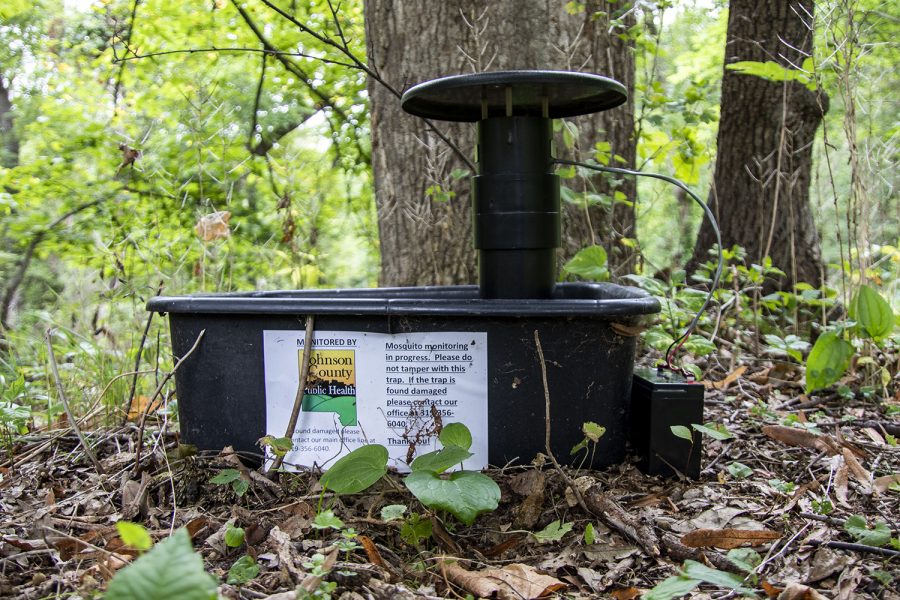Surveillance reveals West Nile virus risk in Johnson County
With help from University of Iowa and Iowa State researchers, the Johnson County Public Health Surveillance Program has found a population of mosquitoes testing positive with West Nile virus in Iowa City.
A mosquito trap is seen on Tuesday, Aug. 31, 2021. The trap, placed by Johnson County Public Health Mosquito Surveillance Program, is located just off a trail in Hickory Hill park. The park is located at 1439 E Bloomington St.
September 7, 2021
A group of mosquitoes trapped near Hickory Hill Park in northeast Iowa City tested positive for West Nile virus late last month.
The Johnson County Public Health Mosquito Surveillance Program, with assistance from researchers at the University of Iowa and Iowa State University, identified a population of mosquitoes that tested positive for the West Nile virus in Iowa City.
This marks the first positive test of West Nile virus in mosquitoes in the county since the Johnson County Public Health Mosquito Surveillance Program was reinstituted in 2017, said Johnson County Environmental Health Manager James Lacina.
Lacina said the county is fortunate this detection did not come sooner.
“We run the surveillance program to keep an eye out to see it locally,” he said. “We have run mosquito traps each summer since 2017 with the idea to get an early warning to residents if we do find it. It’s not like it’s unexpected. We have been lucky not to see it in a mosquito population.”
A West Nile virus strain first came to New York in 1999, resulting in an outbreak across the U.S. that lasted until 2010, according to the World Health Organization.
The last human case of West Nile virus in Johnson County was in 2018, with two positive cases that year. Over the last 10 years, Johnson County has reported six total cases of West Nile virus in humans.
Lacina said the team is currently focused on informing citizens.
“The goal of this program is to identify and educate the public about the risk that is existing in the county so they can take the precautions necessary personally,” he said.
Lacina added that measures can be taken to protect oneself from infectious bites.
“Two key ways are to protect yourself from bites and eliminate the breeding sites,” he said. “Use insect repellent, wear long sleeves, and look if there is standing water in your home or property to eliminate some of that mosquito playing ground.”
Stanley Perlman, professor of microbiology and immunology at the UI, said the virus is a greater threat with COVID-19 if there is more exposure to mosquitoes.
“Otherwise, their modes of transmission are quite different, so one should not affect the other,” he said.
Lacina said the only real way COVID-19 and West Nile virus are connected is in the populations who are most at risk for the respective diseases.
“People who are immunocompromised or elderly are at greater risk of West Nile, as they are for COVID,” Lacina said. “There are similarities in the population that I think really need to show caution to make sure they are not infected.”
While people shouldn’t be alarmed about the county’s findings, Lacina said, it’s important they be educated on the potential risk the virus poses in the community.
“While [chances] may be low that a mosquito in the population has West Nile and transmits it to a human who then may become ill, it’s always a possibility,” he said. “Knowing that West Nile is in mosquitoes in this area should just give people a reason to be a little more careful if they know they are in an environment where mosquitoes may be an issue.”
Lacina said there are a lot of moving parts of the program, and he is thankful for all the partner organizations involved.
“This is the point of the program, that we’ve entered into a nice partnership with the Iowa Department of Public Health, Iowa State University, and the State Hygienic Lab,” he said. “So, a lot of great partner organizations, coming together to try and protect the health of our community.”






